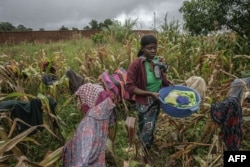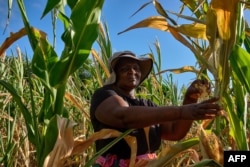President Lazarus Chakwera declared on Saturday evening a state of natural disaster in 23 of the 28 districts of the southern African country, following a government assessment of the damage to farmland caused by El Nino.
"In addition to delayed and erratic rainfall, these districts have faced insufficient rainfall, floods and prolonged dry spells, severely harming crops and food production prospects," Chakwera said in a national address.
"This situation is devastating."
Neighboring Zambia declared a national disaster in late February after drought devastated its agricultural sector.
Major growing areas in Malawi, Mozambique, Namibia, Zambia and Zimbabwe received only 80 percent of average rainfall during the southern hemisphere summer from mid-November to February, according to the United Nations' Food and Agriculture Organization (FAO).
President Chakwera said the Malawian government's initial government found that nearly two million farming households had been affected and 44.3 percent of national crop land has suffered damage.
He estimated that around 200 million dollars of maize would be needed for a humanitarian response program and urged anyone, at home or abroad, in a position to provide resources to support the cause.
"It would have been catastrophic even if this were the first disaster in recent years," Chakwera added.
"Unfortunately, this marks the fourth time in four years that I have declared a state of disaster."
Malawi's Civil Society Agriculture Network (Cisanet) said on Sunday it supported the president's appeal but emphasized the importance of "aligning investments with climate-smart practices" and ensuring there was "transparency in resource allocation."
El Nino is a natural weather phenomenon which is typically associated with increased heat worldwide, as well as drought in some parts of the world and heavy rains elsewhere.
It occurs every two to seven years and lasts between nine and 12 months.












Forum